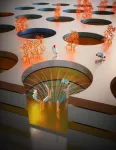New microchip sensor measures stress hormones from drop of blood
2021-06-30
(Press-News.org) New Brunswick, N.J. (June 30, 2021) - A Rutgers-led team of researchers has developed a microchip that can measure stress hormones in real time from a drop of blood.
The study appears in the journal Science Advances.
Cortisol and other stress hormones regulate many aspects of our physical and mental health, including sleep quality. High levels of cortisol can result in poor sleep, which increases stress that can contribute to panic attacks, heart attacks and other ailments.
Currently, measuring cortisol takes costly and cumbersome laboratory setups, so the Rutgers-led team looked for a way to monitor its natural fluctuations in daily life and provide patients with feedback that allows them to receive the right treatment at the right time.
The researchers used the same technologies used to fabricate computer chips to build sensors thinner than a human hair that can detect biomolecules at low levels. They validated the miniaturized device's performance on 65 blood samples from patients with rheumatoid arthritis.
"The use of nanosensors allowed us to detect cortisol molecules directly without the need for any other molecules or particles to act as labels," said lead author Reza Mahmoodi, a postdoctoral scholar in the Department of Electrical and Computer Engineering at Rutgers University-New Brunswick.
With technologies like the team's new microchip, patients can monitor their hormone levels and better manage chronic inflammation, stress and other conditions at a lower cost, said senior author Mehdi Javanmard, an associate professor in Rutgers' Department of Electrical and Computer Engineering.
"Our new sensor produces an accurate and reliable response that allows a continuous readout of cortisol levels for real-time analysis," he added. "It has great potential to be adapted to non-invasive cortisol measurement in other fluids such as saliva and urine. The fact that molecular labels are not required eliminates the need for large bulky instruments like optical microscopes and plate readers, making the readout instrumentation something you can measure ultimately in a small pocket-sized box or even fit onto a wristband one day."
INFORMATION:
The study included Rutgers co-author Pengfei Xie, a Ph.D. student, and researchers from the University of Minnesota and University of Pennsylvania. The research was funded by the DARPA ElectRX program.
Broadcast interviews: Rutgers University has broadcast-quality TV and radio studios available for remote live or taped interviews with Rutgers experts. For more information, contact John Cramer at john.cramer@rutgers.edu
ABOUT RUTGERS--NEW BRUNSWICK
Rutgers University-New Brunswick is where Rutgers, the State University of New Jersey, began more than 250 years ago. Ranked among the world's top 60 universities, Rutgers's flagship is a leading public research institution and a member of the prestigious Association of American Universities. It has an internationally acclaimed faculty, 12 degree-granting schools and the Big Ten Conference's most diverse student body.
[Attachments] See images for this press release:

ELSE PRESS RELEASES FROM THIS DATE:
2021-06-30
A new study based on computational analyses of how SARS-CoV-2 interacts with host cell proteins has identified 200 previously approved drugs that could be repurposed to treat COVID-19, 40 of which have already entered clinical trials. Furthermore, Namshik Han and colleagues identified 30 proteins induced by the SARS-CoV-2 virus that are targeted by 8 or more existing drugs, finding that nitric oxide production, which is important for viral synthesis, may be targeted by these drugs to fight infection. The researchers also identified 2 of these drugs with good safety profiles that successfully reduced viral replication in cellular assays, suggesting they could potentially prevent or treat COVID-19. Scientists now have sufficient ...
2021-06-30
The Bronze Age in the eastern Mediterranean has long been considered by researchers to have been the 'first international age,' especially the period from 1600-1200 BC, when powerful empires from Anatolia, Mesopotamia, and Egypt set up large networks of subordinate client kingdoms in the Near East. These empires fought, traded, and corresponded with one another, and ancient texts from the period reveal rich economic and social networks that enabled the movement of people and goods.
A new study conducted by an interdisciplinary team of archaeologists, geneticists, and isotope experts, and published in PLOS ONE, investigated the movement of people in this period at a single regional center, a Bronze Age city-state called Alalakh in present-day southeastern Turkey. Their results indicate ...
2021-06-30
University of Leeds news
Embargo: Wednesday 30 June, 7pm GMT
Bereavement care lacking for ethnic minorities
Grieving friends and relatives from ethnic minority backgrounds are suffering from a lack of appropriate help to cope with the loss of a loved one, especially during the COVID-19 pandemic, researchers say.
And the scarcity of data on the services that are available means providers do not know how support should be delivered to ensure they are suitable for different groups of people.
The researchers, led by the University of Leeds and the University of Sheffield, reviewed evidence on UK bereavement care for ethnic minority ...
2021-06-30
Research at Baylor College of Medicine, the Texas Heart Institute and collaborating institutions is moving a novel promising gene therapy to treat heart failure closer to the clinic.
Published in Science Translational Medicine, the study showed that knocking down the Hippo signaling pathway in cardiomyocytes in the hearts of pigs after they had a heart attack, resulted in heart tissue renewal and improved function when compared with pig hearts in which the Hippo signaling pathway was not modified. Given that the pig's heart is considered a valuable model to study the human heart, the findings suggest that this gene therapy may be useful in treating human heart failure.
Heart failure remains the leading cause of mortality in the western ...
2021-06-30
A study published in Science Advances reports on the unexpected observation of thermal waves in germanium, a semiconductor material, for the first time. This phenomenon may allow a significant improvement in the performance of our electronic devices in a near future. The study is led by researchers from the Institute of Materials Science of Barcelona (ICMAB, CSIC) in collaboration with researchers from the Universitat Autònoma de Barcelona, and the University of Cagliari.
Heat, as we know it, originates from the vibration of atoms, and transfers by diffusion at ambient temperatures. Unfortunately, ...
2021-06-30
Cambridge scientists have identified 200 approved drugs predicted to work against COVID-19 - of which only 40 are currently being tested in COVID-19 clinical trials.
In a study published today in Science Advances, a team led by researchers at the University of Cambridge's Milner Therapeutics Institute and Gurdon Institute used a combination of computational biology and machine learning to create a comprehensive map of proteins that are involved in SARS-CoV-2 infection - from proteins that help the virus break into the host cell to those generated as a consequence of infection. By examining this network using artificial intelligence (AI) approaches, ...
2021-06-30
Language distinguishes us humans; we learn it through experience and social interactions. Especially in the first year of life, human vocalizations change dramatically, becoming more and more language-like. In our closest relatives, non-human primates, language development was previously thought to be largely predetermined and completed within the first few weeks after birth. In a behavioral study now published, researchers from the German Primate Center, the University of Tübingen and the Rockefeller University New York were able to show that the infantile development of vocalizations in common marmosets also includes an extended flexible phase, without ...
2021-06-30
Researchers from Baidu Research Robotics and Auto-Driving Lab (RAL) and the University of Maryland, College Park, have introduced an autonomous excavator system (AES) that can perform material loading tasks for a long duration without any human intervention while offering performance closely equivalent to that of an experienced human operator.
AES is among the world's first uncrewed excavation systems to have been deployed in real-world scenarios and continuously operating for over 24 hours, bringing about industry-leading benefits in terms of enhanced safety and productivity.
The researchers described their methodology in a research paper published ...
2021-06-30
Researchers studying the intersection of politics and psychology have long documented a link between threat sensitivity and social conservatism: People who are more socially conservative tend to react more strongly to threats. Conversely, those who are more socially liberal tend to be less sensitive to threats, viewing the world as a generally safe place and embracing change to explore new possibilities.
These findings have held across a variety of events, but during the pandemic, U.S. polls show that Democrats, who tend to be more liberal, have generally been more concerned about the COVID-19 threat than ...
2021-06-30
URBANA, Ill. - Proteins have been quietly taking over our lives since the COVID-19 pandemic began. We've been living at the whim of the virus's so-called "spike" protein, which has mutated dozens of times to create increasingly deadly variants. But the truth is, we have always been ruled by proteins. At the cellular level, they're responsible for pretty much everything.
Proteins are so fundamental that DNA - the genetic material that makes each of us unique - is essentially just a long sequence of protein blueprints. That's true for animals, plants, ...
LAST 30 PRESS RELEASES:
[Press-News.org] New microchip sensor measures stress hormones from drop of blood


